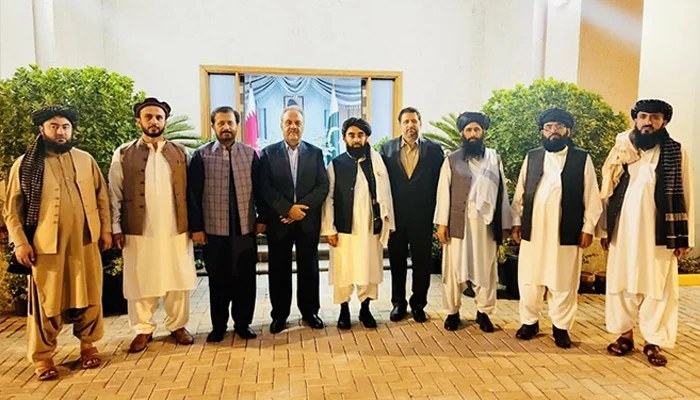Pakistani Ambassador Hosts Dinner for Afghan Taliban Delegation
In a significant diplomatic engagement following Islamabad’s announcement of an operation against Afghanistan-based terrorists, an Afghan Taliban delegation led by Zabihullah Mujahid, the spokesperson for the Afghan interim government, met with Pakistani diplomats during the Doha-III conference.
Pakistan and Afghanistan have historically enjoyed close and brotherly ties as neighboring South Asian countries. However, relations have recently become strained due to frequent cross-border attacks, primarily carried out by the banned Tehreek-e-Taliban Pakistan (TTP). According to Pakistani security officials, the TTP operates from Afghan soil, exacerbating tensions between the two nations.
The Afghan interim government’s representatives are currently in Doha to engage in talks aimed at increasing engagement with Afghanistan and developing a more coordinated response to various issues, including economic challenges and counter-narcotics efforts. The delegation is scheduled to meet with UN officials and over 20 envoys, including the US special representative to Afghanistan, as the international community grapples with its approach to Kabul’s new rulers.
During their visit, Pakistani Ambassador to Qatar, Muhammad Aejaz, hosted a dinner for the Afghan Taliban delegation at his residence in Doha. The event was attended by senior diplomats, including Pakistan’s Special Representative on Afghanistan, Asif Durrani, and the country’s Deputy Head of Mission in Kabul, Ubaid Ur Rehman Nizamani. Durrani shared photos of the occasion on X (formerly Twitter), highlighting discussions on developments at the Doha-III conference and various bilateral and regional issues.
The Pakistani envoy to Qatar expressed his delight on X, stating, “Very delighted to have hosted tonight the AIG [Afghanistan interim government] and Pakistan delegations attending the Doha-III [conference]. Both remain neighbours and brothers and have a lot in common, including a strong desire for regional peace and security.”
Diplomatic sources described the meeting as “unusual,” noting that Taliban representatives also met with an Indian delegation in Doha. The engagement was reportedly held in a “positive environment,” with Afghan interim government representatives thanking Islamabad for supporting Kabul’s stance at the Doha conference and for its national-level backing.
Zabihullah Mujahid expressed gratitude on the microblogging website, stating, “We had a very good evening meeting with Pakistan’s special representative Asif Durrani, the ambassador and consuls in Doha. We thank them for their hospitality and hope for good and constructive relations for both countries.”
The federal government of Pakistan recently approved Operation Azm-e-Istehkam, a reinvigorated national counter-terrorism drive aimed at eliminating terrorism from the country. Federal Minister for Defence, Khawaja Asif, criticized the Afghan government for its inaction against militants along the Pakistan-Afghanistan border, despite repeated requests from Pakistan.
Asif stated that under Operation Azm-e-Istehkam, Pakistan could target terrorist hideouts across the border in Afghanistan. He also dismissed the possibility of negotiations with the outlawed TTP. Prime Minister Shehbaz Sharif clarified that the operation would not be a large-scale military endeavor and would not result in population displacement.
During the Afghan Taliban’s rule, Pakistan conducted intelligence-based operations (IBOs) in the border regions inside Afghanistan against terrorists belonging to the Hafiz Gul Bahadur Group, responsible for multiple attacks in Pakistan. However, the Afghan interim government strongly reacted to these “air strikes,” warning that it would not allow anyone to compromise security by using Afghan territory.
The recent diplomatic engagements between Pakistan and the Afghan Taliban at the Doha-III conference mark a significant step towards addressing mutual concerns and improving strained relations. With ongoing efforts like Operation Azm-e-Istehkam, both countries aim to enhance regional peace and security while addressing the persistent threat of terrorism. The positive environment and mutual expressions of goodwill during the Doha meetings offer hope for more constructive relations between Pakistan and Afghanistan in the future.

